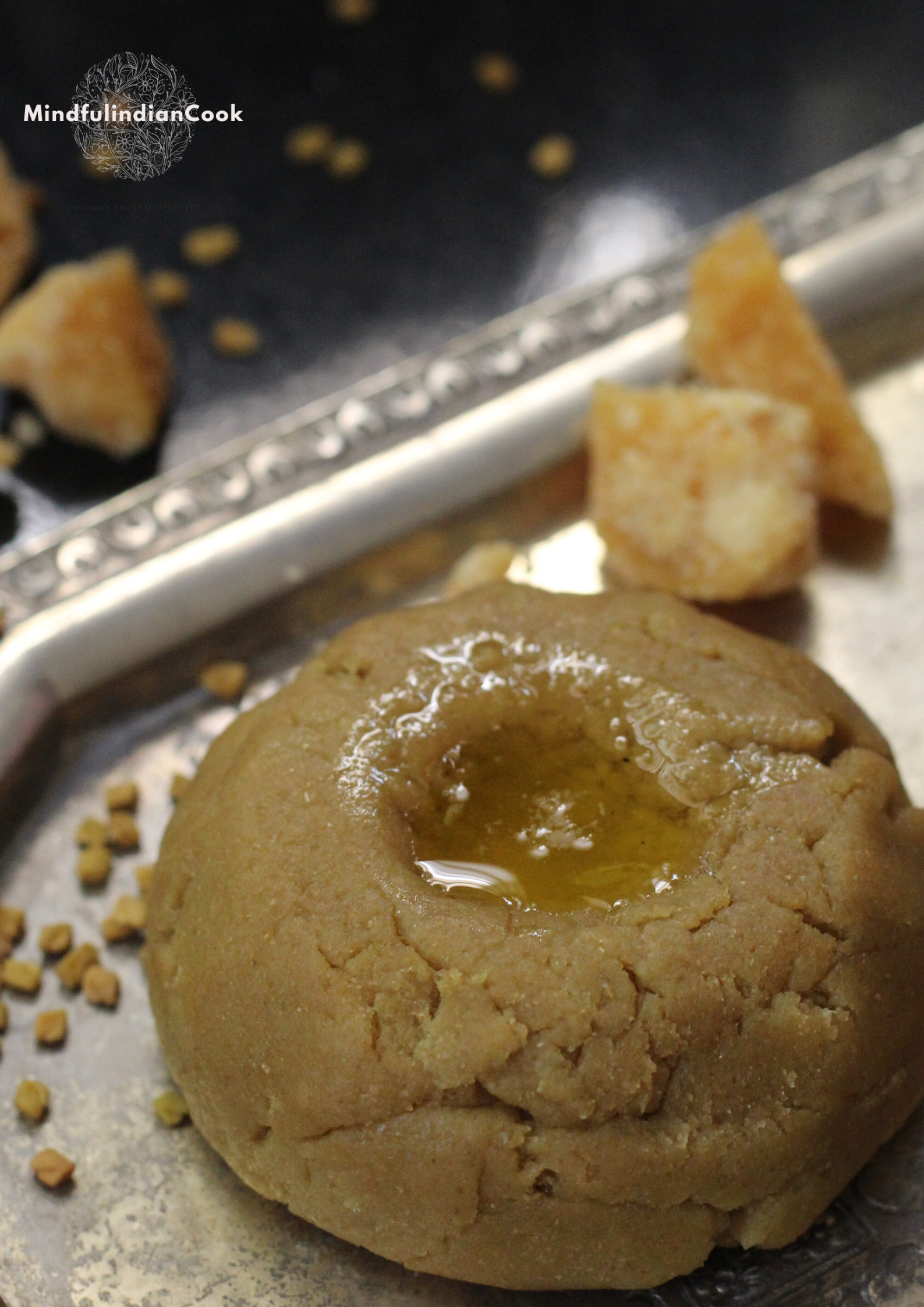Methi (Fenugreek) Balls /Menthya Hittu
INTRODUCTION : This is a superfood, prepared in some parts of Karnataka and is given to girls when they attain puberty and to lactating mothers. It is known to strengthen bones and relieve lower back pain. It is a good breakfast item, easy and quick to make and quite filling.
INGREDIENTS :
Methi flour : 2 tbsp
Wheat flour : 2 tbsp
Milk : 1 cup (150 mL), water can be used
Jaggery powder : 1 tbsp (for medium sweetness)
Ghee: 1tbsp
Cardamom powder : pinch (optional)
Copra/grated coconut : 1-2 tbsp (optional)
METHOD : Boil milk/water in a non-stick pan, add ghee and jaggery, add both flours and mix well. Add copra/coconut, cardamom powder. It forms a soft ‘ball’, allow it to cook for 3-4 min. Turn off the heat. Serve hot with ghee. This should be chewed, unlike ragi balls. You could make a methi ball the size of cricket ball with the above quantities.
If you don’t like the mild bitterness of methi, increase the portion of wheat flour (1:3).
Preparation Time : ~10 min
VARIATIONS IF ANY :
INFORMATION
Vegan - YES (if vegan milk is used)
Gluten Free - No
Keto Friendly -Glycemic Index (GI) is the rate of release of glucose in to blood stream (GI of glucose equal to 100)
Jaggery: White/table Sugar = 68 GI; Jaggery
CALORIES :
~390 Cal (Ghee 1 tbsp = 85 cal; Methi flour 2 tbsp=48 Cal; Wheat flour 1 tbsp= ~50 Cal ; Whole fat milk 150 mL = 90 Cal; Jaggery 1tbsp = 120 Cal)
NUTRITIVE VALUE :
Methi/Fenugreek contains many essential nutrients, rich in protein dietary fiber, manganese and iron and is a strong antioxidant.
100 g fenugreek seeds provide 323 kcal and contain 9% water, 58% carbohydrates, 23% protein and 6% fat, with calcium 176 mg (40% of the daily value).
Depending on the source, 100 grams (half a cup) of jaggery may contain : Calories: 383; Sucrose: 65–85 grams, Fructose and glucose: 10–15 grams, Protein: 0.4 gram, Fat: 0.1 grams, Iron: 11 mg, or 61% of the RDI.
Jaggery contains more nutrients than refined sugar because of its molasses content. It contains many minerals such as Magnesium, Potassium, Calcium, Selenium, Manganese and Zinc and small amounts of B vitamins.
HEALTH BENEFITS :
Fenugreek is one of the oldest medicinally used plants, in both traditional Indian and Chinese systems of medicine. However, of all the reported health benefits of fenugreek, only a few have been substantially backed by scientific evidence. Also, excessive use of fenugreek seeds is not recommended during pregnancy as it could be a reason of miscarriage or premature childbirth.
Funugreek is known to help in fighting fever, they stabilise blood sugar levels, inflammation, aid in digestion, weight loss, regulate cholesterol levels, increase breast milk, controlling hair fall and dandruff. Emmenagogues property of fenugreek seeds make them beneficial for increasing menstrual flow. They improve uterine contractions.
Soothing properties in fenugreek seeds are helpful in dealing with sore throats. They have analgesic properties along with mucilage, both of which are good for sore throat. Ayurveda suggests that you can mix fenugreek seeds with tamarind leaves to make a gargle for easing sore throat. A fenugreek tea is made with a concoction of honey and lemon.
Jaggery : According to some reports, jaggery is absorbed slowly in to the blood stream, it is good for lungs, and in treating throat infections, reduces migraine frequency, helps in bile disorder, to cure dry cough, reduces acidity (when taken along with dry ginger), and acts as a cleansing agent.
ORIGIN : Fenugreek (Trigonella foenum-graecum) is an annual plant of the family Fabaceae, and related to beans and is a native of the Indian subcontinent and the Eastern Mediterranean region.
Sugarcane (Saccharum officinarum) belongs to the grass family Poaceae.
Sugarcane was originally domesticated around 8000 BC in New Guinea. From there knowledge about this plant reached Southeast Asia until it reached India, where the first organized production of sugar began during middle of 1st millennia BC.
WATER FOOTPRINT (is litres of water needed to produce the food) :
Fenugreek seeds : NA; Wheat flour : 1850 L/Kg; Raw sugar : 1666 L/Kg (data not available for jaggery)
GENERAL TIPS : You could prepare more and refrigerate it and warm it up in microwave or stove and eat portions of it everyday.
DID YOU KNOW :
Fenugreek seeds are bitter in taste but lose their bitterness if roasted slightly and when they are sprouted, the flavour becomes pungently sweet, adding a unique taste to salads and other foods.
Both sugar and jaggery are prepared from sugarcane or date palm. However, Jaggery has many health benefits and is less polluting than sugar. Sugar refining process utilises large amounts of water and chemicals and pollutes air, water and soil.
REFERENCES :
http://www.sugarhistory.net/sugar-making/sugarcane/
https://waterfootprint.org/media/downloads/Report47-WaterFootprintCrops-Vol1.pdf
https://doctor.ndtv.com/living-healthy/bet-you-didnt-know-these-benefits-of-fenugreek-seeds-1843896
https://www.medicalnewstoday.com/articles/324334#nutrition
https://en.wikipedia.org/wiki/Fenugreek
https://goqii.com/blog/15-things-you-did-not-know-about-fenugreek-methi
https://www.royalsundaram.in/blog/health-insurance/jaggery-or-sugar-the-smarter-choice
https://www.healthline.com/nutrition/jaggery#section2

